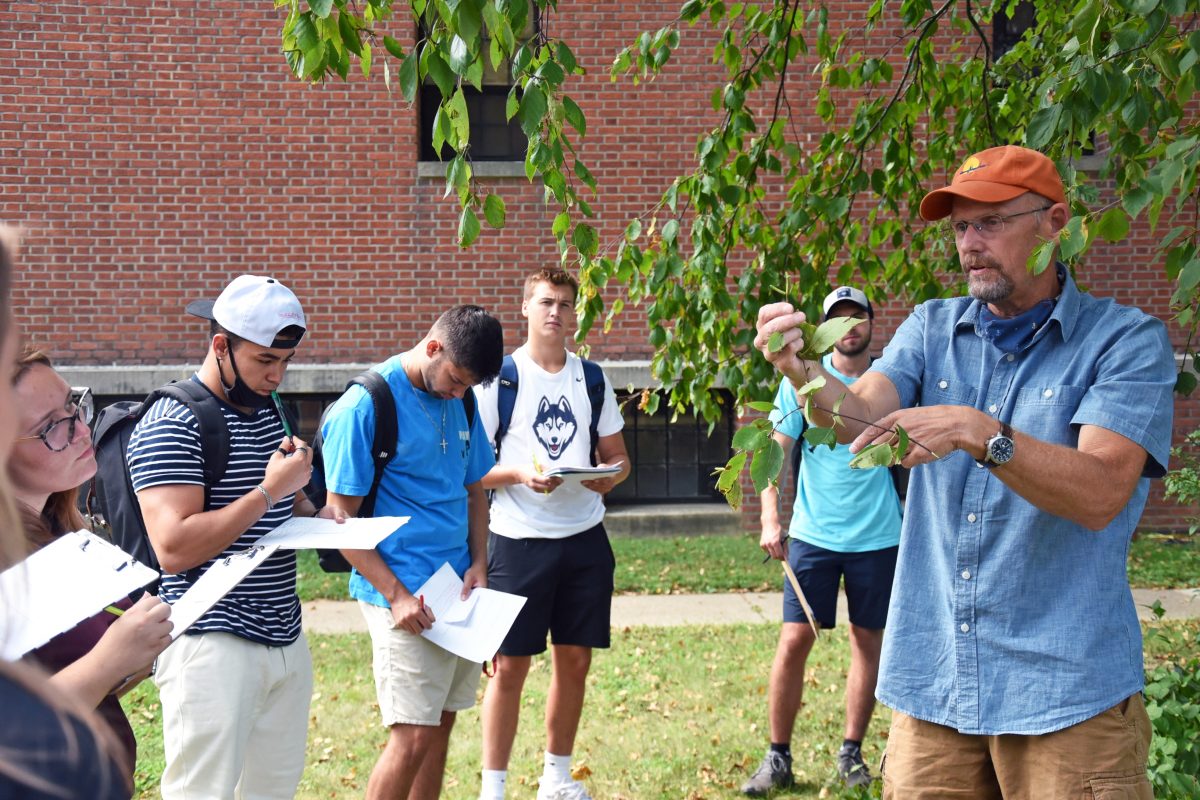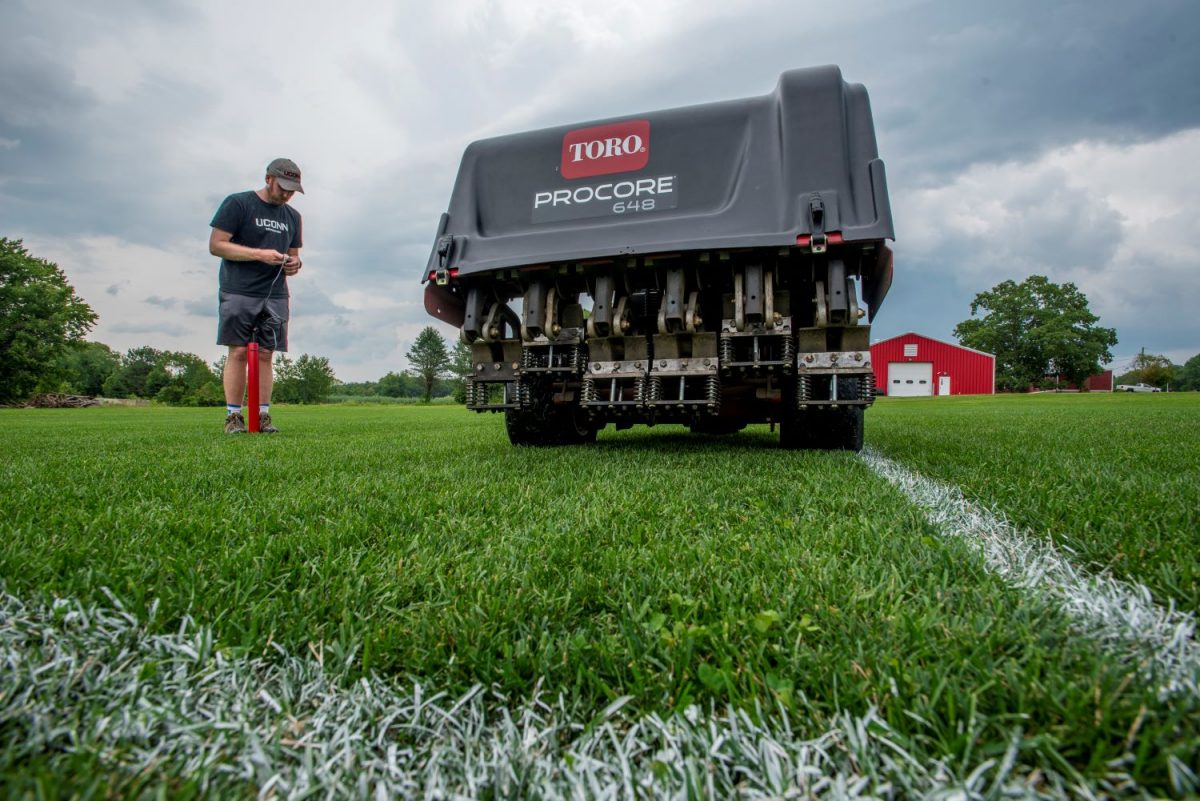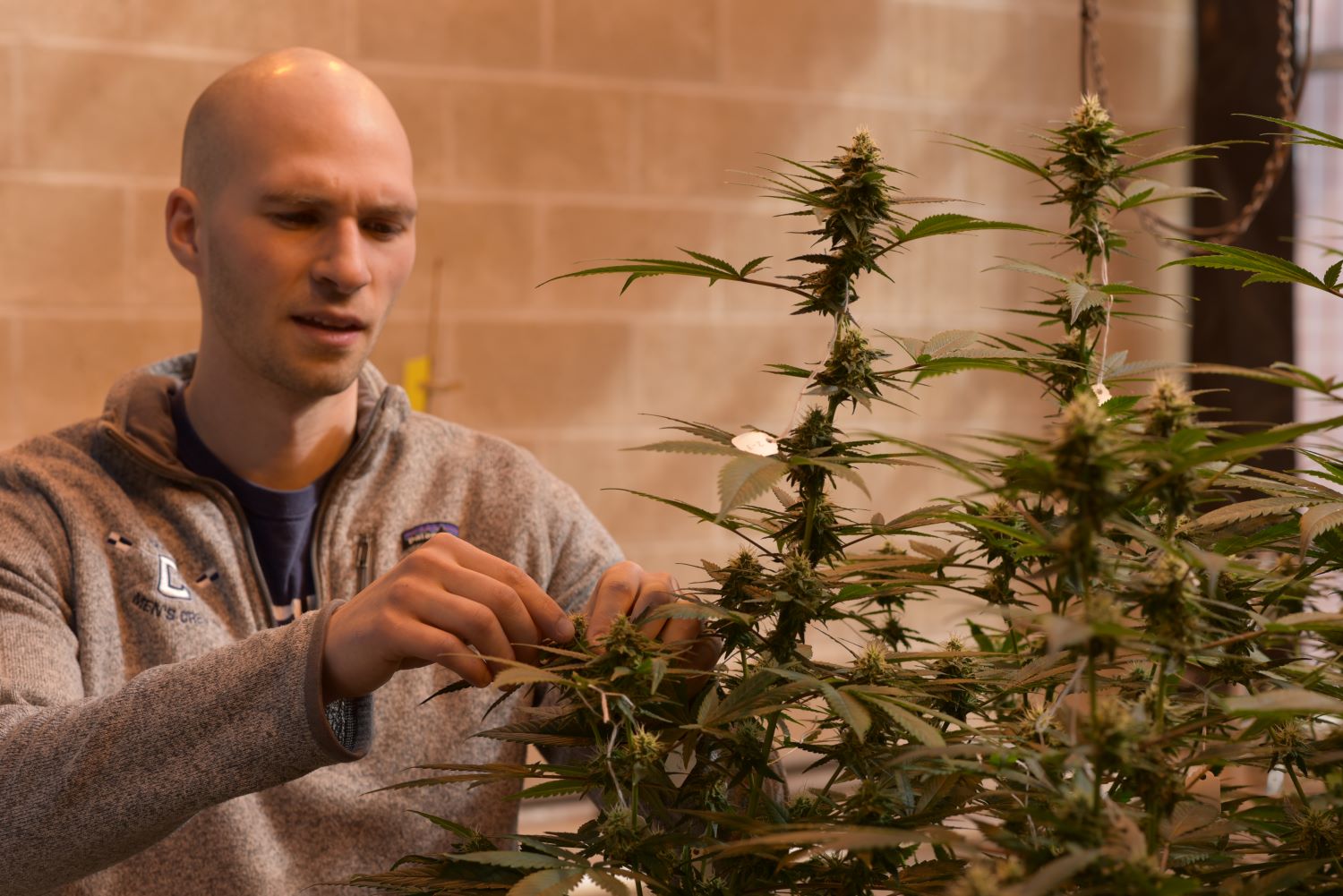Plant Science Programs
Plant Science majors in the Ratcliffe Hicks School of Agriculture receive an Associate of Applied Science (AAS) degree. Students may concentrate in Ornamental Horticulture, Turfgrass Management, or Sustainable Crop Production. The Plant Science program in the Ratcliffe Hicks School is offered by the Department of Plant Science and Landscape Architecture.
Ornamental Horticulture
The Ornamental Horticulture concentration reflects the diversity of the industry in the state. Despite its urban nature, Connecticut has more trees and green space per square mile than any other state. The state ranks tenth in the nation in nursery production and has a strong greenhouse industry as well as viable orchard, vegetable, Christmas tree, and pick-your-own operations. Florists, garden centers, landscapers, groundskeepers and arborists are also growing industries. With this diversity in mind, the Ratcliffe Hicks School of Agriculture offers balanced curricula covering many aspects of plant science. Students studying Horticulture may choose to focus on Floriculture, Nursery Management, and/or Landscaping.
Recommended Course Sequence for Ornamental Horticulture
Concentration Objectives
The goal of the Ornamental Horticulture concentration is to prepare students for employment, management, or entrepreneurial positions in florist, garden center, landscaping, greenhouse and nursery operations or related businesses.
A graduate of the program should be able to:
- Understand basic fundamentals of plant growth
- Understand relationships between soil and plants
- Understand plant water relationships
- Understand Integrated Pest Management related to plant management
- Understand plant/environment interactions
- Understand how plant management practices/strategies effect water quality and the environment
- Identify and describe insect, disease, and physiological problems of plants and develop control strategies
- Communicate effectively both orally and in writing
- Demonstrate skills in accessing information
- Demonstrate mathematical skills utilized by today’s Green Industry
- Identify major taxa of ornamental plants, both woody and herbaceous
- Demonstrate an understanding of the principles of landscape plant management
- Demonstrate an understanding of the principles of horticultural crop production
- Demonstrate an understanding of the appropriate uses of ornamental plants
- Demonstrate an understanding of the principles and practices of plant propagation.
- Demonstrate a professional attitude in relationships with employers, customers, fellow employees, and professional peers.
- Understand the importance of professional development, continuing education, and life-long learning as components of a successful career
The Department of Plant Science and Landscape Architecture offers a wide range of courses in Horticulture providing both academic and applied educational opportunities. Descriptions of all of the courses in the Ratcliffe Hicks School of Agriculture can be found in the Undergraduate Catalog.
Career Opportunities
Career options are wide open for graduates of our program. Through the years, graduates have gone into business for themselves, or worked in floricultural or nursery production, sales, landscaping, groundskeeping, retail garden centers, florist shops. Others have moved into management positions. Many graduates have continued their education in baccalaureate and graduate programs.
If you are interested in additional information, including application timeline, please complete this form.
Turfgrass Management
The Turfgrass Management concentration is designed to provide students with basic and applied knowledge in turfgrass science and management. Formal and informal learning settings offer students the opportunity to gain a great deal of hands-on experience and design a unique educational experience, with exposure to all aspects of the industry. Students complete course work in turfgrass management and other related fields, such as soil science and fertility, pest control, ornamental horticulture, landscape design, environmental science, and business management. Internships arranged with landscape or lawn care businesses, golf courses, athletic facilities, and municipal, state or federal agencies allow students to gain practical experience and engage in career networking.
Recommended Course Sequence for Turfgrass Management Concentration
Concentration Objectives
The goal of the concentration is to prepare students for employment in residential and commercial landscaping, golf courses, athletic and recreational fields, and parks and recreational land management.
A graduate of the program should be able to:
- Understand basic fundamentals of plant growth
- Understand relationships between soil and plants
- Understand plant water relationships
- Understand Integrated Pest Management related to plant management
- Understand plant/environment interactions
- Understand how plant management practices/strategies effect water quality and the environment
- Identify and describe insect, disease, and physiological problems of plants and develop control strategies
- Communicate effectively both orally and in writing
- Demonstrate skills in accessing information
- Demonstrate mathematical skills utilized by today’s Green Industry
- Understand how cultural practices influence the growth and quality of turfgrass
- Understand how environmental conditions influence the growth and quality of turfgrass
- Recognize important pests (weeds, insects, diseases) of turfgrass and understand how to develop environmentally responsible control programs for these pests
- Understand how soil chemical and physical properties influence the growth and quality of turfgrass
- Demonstrate a professional attitude in relationships with employers, customers, fellow employees, and professional peers.
- Understand the importance of professional development, continuing education, and lifelong learning as components of a successful career Understand the biology, ecology, and taxonomy of cool-season turfgrass
The Department of Plant Science and Landscape Architecture offers a wide range of courses in Turfgrass Management providing both academic and applied educational opportunities. Descriptions of all of the courses in the Ratcliffe Hicks School of Agriculture can be found in the Undergraduate Catalog. Highly qualified, experienced and dedicated faculty members provide an excellent educational environment.
Career Opportunities
After completing the Turfgrass Management concentration, our graduates apply their skills to turf related careers, such as residential and commercial landscaping, golf courses, athletic and recreational fields, and parks and recreational land management. Many graduates have continued their education in baccalaureate and graduate programs.
If you are interested in additional information, including application timeline, please complete this form.
Sustainable Crop Production
The Sustainable Crop Production concentration reflects an expanding field of interest in food and forage crops grown locally, regionally, and nationally, with an emphasis on environmentally sound practices, and the sustainable management of agricultural and horticultural lands through practices that optimize soil health. Local and organic production practices are emphasized along with technologies for crop production in urbanized setting such as controlled environment agriculture. Internships with commercial and private farming operations, as well as at the UConn Spring Valley Student Farm, provide experiential and service learning opportunities.
Recommended Course Sequence for Sustainable Crop Production
Concentration Objectives
The goal of the Sustainable Crop Production concentration is to prepare students for employment, management, or entrepreneurial positions at any point along the food chain – from field to fork.
A graduate of the program should be able to:
- Understand basic fundamentals of plant growth
- Understand soil management with respect to plant nutrient and water management
- Understand plant/environment interactions
- Understand Integrated Pest Management in relation to sustainable pest control
- Identify and describe weed, insect, disease, and physiological problems of plants and develop control strategies
- Communicate effectively both orally and in writing
- Demonstrate skills in accessing information
- Demonstrate mathematical skills utilized in the modern food production operations
- Demonstrate an understanding of the principles of agroecology and sustainable crop production
- Understand the technical challenges to managing a farm
- Demonstrate a professional attitude in relationships with employers, customers, fellow employees, and professional peers.
- Understand the importance of professional development, continuing education, and life-long learning as components of a successful career
The Department of Plant Science and Landscape Architecture offers a wide range of courses in Sustainable Agriculture providing both academic and applied educational opportunities. Descriptions of all of the courses in the Ratcliffe Hicks School of Agriculture can be found in the Undergraduate Catalog.
Career Opportunities
Many career options are available for graduates of our program. Employment opportunities include working on small- and large-scale farms, greenhouse and hydroponic/aquaponic operations, retail and wholesale food outlets, co-ops, and associated businesses and industries that support food crop and livestock production; owning and managing a farm, greenhouse, or hydroponic/aquaponics operation. Qualifying graduates can continue their education and transfer credits to baccalaureate programs.
If you are interested in additional information, including application timeline, please complete this form.


